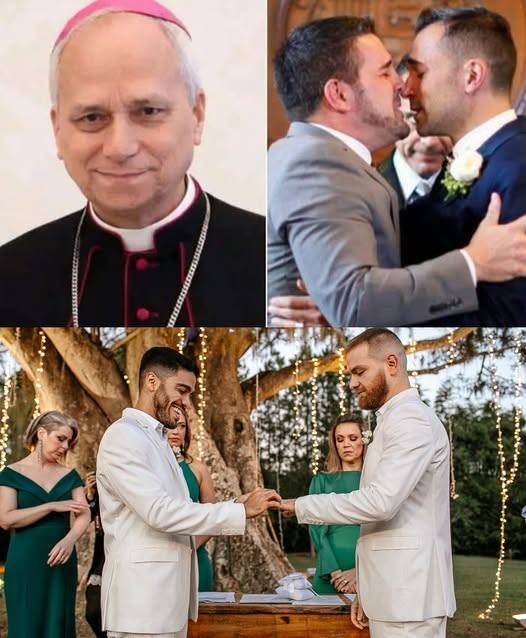In an era dominated by soundbites, viral hashtags, and headlines that rarely last more than a day, it is unusual for a single word to capture global attention. Yet that is exactly what happened when newly elected Pope Leo XIV, formerly Cardinal Robert Prevost of Chicago, responded to a question with one word—“Many.” For some, it was profound. For others, confusing. And for countless others, it was an invitation to interpret, speculate, and debate.
The moment unfolded on May 12, 2025, just days after Leo XIV’s historic election as the first American pope. Standing before a packed press corps at the Vatican, the new pontiff faced a barrage of questions. Reporters wanted to know his vision for the Catholic Church, his priorities as leader, and of course, his thoughts about his home country, the United States.
When asked directly if he had a message for America, the Pope paused briefly. Then, instead of a long reflection, he answered with a single, ambiguous word:
“Many.”
He followed it only with, “God bless you all,” before leaving the podium.
The entire exchange lasted no more than a few seconds, but its impact was immediate. Within minutes, “Many” was trending across social media platforms. News outlets replayed the clip on loop, while blogs and commentators launched into analysis. What did he mean? Was it a slip? A deliberate act of brevity? Or something else entirely?
Possible Interpretations of “Many”
The ambiguity gave rise to countless theories. Three major interpretations have emerged as the most compelling.
1. A Broad Blessing
The most generous reading suggests Pope Leo XIV was offering an open-handed blessing—saying, in essence, that he had “many prayers” or “many hopes” for America. In this interpretation, the word was not incomplete but poetic, inviting reflection instead of certainty. Catholic leaders throughout history have often spoken in metaphor and suggestion, leaving their words to be unpacked by the faithful. In this sense, “Many” may have been a way of communicating abundance: many blessings, many graces, many prayers.
2. An Incomplete Thought
Others argue it may have been the start of a sentence that was left unfinished. “Many challenges.” “Many opportunities.” “Many prayers.” Any of these could have been where he was headed before deciding, perhaps in the pressure of the moment, to keep it short. Even seasoned leaders can stumble in front of live cameras, and sometimes a hesitation becomes the entire message.
3. A Reflection of America’s Complexity
A third interpretation sees the word as a deliberate nod to the multiplicity of America itself. The United States is a country of many voices, many contradictions, and many possibilities. By uttering “Many,” Pope Leo XIV could have been holding up a mirror, recognizing both the richness and the challenges of his homeland’s diversity. In Catholic teaching, unity through diversity is a central idea, and the word could be read as a subtle theological gesture toward that principle.
Public Reaction: Humor, Debate, and Silence
Reactions to the Pope’s brevity ran the full spectrum. Social media lit up with jokes and memes. Some users quipped that “Many” was the shortest papal encyclical in history. Others suggested it was ripe for T-shirts, hashtags, and internet parody.
At the same time, more serious voices treated the word with gravity. Conservative commentators speculated that it might be a veiled critique of American politics or culture, while progressives saw it as an invitation to inclusivity and openness. Religious scholars pointed to the Pope’s history as a thoughtful, careful communicator and argued the choice was intentional.
The Vatican, however, remained silent. No clarification was issued, and the Pope himself has not returned to the moment in subsequent speeches. That silence has only deepened the intrigue.
Historical Echoes of Minimalism
While unusual, Pope Leo XIV’s one-word statement is not entirely without precedent. In 1963, Pope John XXIII was asked what message he had for the world. His answer was a single word: “Peace.” U.S. President Calvin Coolidge, nicknamed “Silent Cal,” once explained his famously terse style with a one-word reply: “Because.” Even in literature, Hemingway proved brevity’s power with his six-word story: “For sale: baby shoes, never worn.”
In each case, brevity invited emotion, speculation, and reflection. Words did not need to be many to resonate. Sometimes, fewer words allow audiences to project their own meaning.
What “Many” Reveals About Us
Perhaps the most revealing aspect of this episode is not what Pope Leo XIV meant, but how the world responded. In an age where clarity and quick soundbites are demanded from public figures, ambiguity feels unsettling. Yet that very ambiguity can also be powerful.
The fact that “Many” became headline news shows how hungry audiences are for meaning, even when none is provided outright. It highlights how context, interpretation, and perception shape modern communication. In some ways, the frenzy around the word says more about us than it does about the Pope. When leaders are vague, we fill in the blanks with our own hopes, fears, and anxieties.
Conclusion: A Word That Won’t Be Forgotten
Whether Pope Leo XIV’s reply was a poetic gesture, an incomplete sentence, or a moment of hesitation, it has undeniably struck a chord. For some, it was deeply meaningful. For others, puzzling. For all, it was unforgettable.
At a time when every phrase from a global leader is dissected and debated, perhaps the most powerful messages are those that resist easy explanation. “Many” might be remembered not because it explained, but because it invited reflection. In that sense, the Pope may have delivered exactly what was needed: a reminder that meaning does not always come from explanation. Sometimes, it comes from silence, mystery, and the space left behind by a single word.



